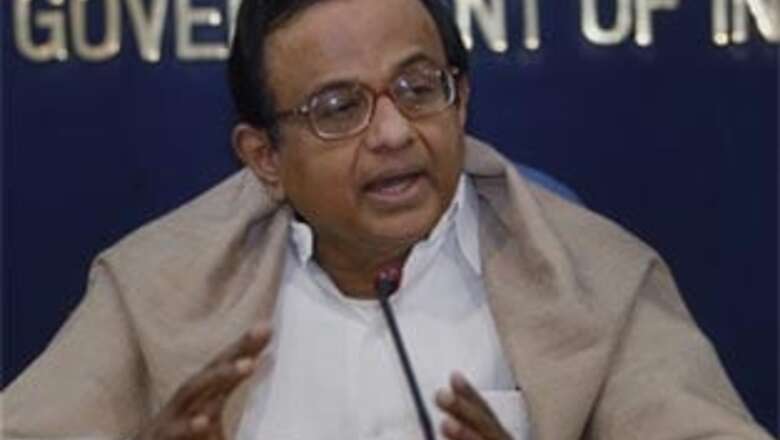
views
The market hit upper circuit in the first ten seconds of trade and Home Minister, P Chidambaram said this reaction from the market was expected.
“This response is on the back of a stable government; a government which will run the course of five years.”
Chidambaram promised a full Budget in 45 days from the day of formation of government. “The Congress Manifesto is crisp and growth oriented.” He stated that another stimulus package if any would be decided by the Finance Minister after consultation with the Prime Minister.
Chidambaram sees a case for interest rates to come down and said the new government would take a view. He stated the government would maintain a balance between stimulating demand and fiscal discipline.
“We will get to the path of fiscal balance soon, as told in manifesto and and get back to the Financial Responsibility and Budget Management (FRBM) targets.“ He added that the UPA’s disinvestment plan would happen and more FDI would be welcomed into India.”
Public sector companies will be allowed to go to the market, he said.
PAGE_BREAK
Here is a verbatim transcript of the exclusive interview with P Chidambaram on CNBC-TV18. Also watch the accompanying video.
Q: As you can see, the stock markets have given thumbs up, the markets clearly giving a vote of confidence to the fact that we have got a stable government at the center, your initial thoughts, what would you signal as the former Finance Minister be to both domestic as well as foreign investors and to Corporate India at this point?
A: This response from the market was expected; over the weekend the message had gone out loud and clear that there would be a stable and strong government, a government that will run its full course of five years under Dr. Manmohan Singh, that’s a huge positive.
Secondly, the Congress Party’s manifesto is a crisp document that spells out our plans and the CWC (Congress Working Committee) resolution yesterday reiterated that we will forge ahead on the path of faster and more intrusive growth and all these are positives to which the market has responded and I am sure that the government will deliver.
Q: Just to get a sense of what the thinking is of the Congress, the Congress manifesto had spoken about the budget over the next 45 days once the government formation actually took place, are you sticking to that timeline and what can we actually expect from this budget given the fact that we are facing a global slowdown, do you think there is room or necessity for another stimulus package?
A: We promised that there will be a full budget within 45 days and we intend to keep that promise, so you count 45 days from the date of government formation. As far as another stimulus package is concerned, that is the decision that has to be taken by the Finance Minister in consultation with the Prime Minister after the government is formed.
I think it’s premature to talk about another package now, the Finance Minister will certainly asses the overall economic situation on the day the government is formed.
Q: You spoke about Congress manifesto, it was a short and crisp document but it was also a document short on details?
A: Was it? I thought there were enough words in the document that indicated the direction in which we will go and the pace at which we will go.
PAGE_BREAK
Q: But it didn’t talk about the contentious issues, insurance, pension reforms, banking bills, will these bills go through be cause we understand and we know that it has the Congress’s approval and in a lot of cases it even has a group of minister’s approval, will these bills go through?
A: There is no need to talk about issues on which the government has already taken decisions. Please remember, on the insurance bill the government took a decision and introduced the amendment bill on PFRDA (Pension Fund Regulatory & Development Authority), a bill was introduced in Parliament, so those are decisions that have been taken, why should a Congress government or a Congress led government go back on those decisions. What the Congress manifesto spoke about are new issues or issues which required further articulation.
Q: A quick question as far as exemptions are concerned, there is anticipation or hope atleast as far as technology is concerned that in order for the tech sector to be cushioned from the global slowdown, the government could consider an extension of the STPI (Software Technology Parks of India) scheme, in the past both you as well as Prime Minister Manmohan Singh have spoken about exemptions that have outlived their utility and are as needing to go, do you think there will be an extension for schemes like the STPI or will the sun finally set?
A: Our basic position is, every exemption must be constantly reviewed and all exemptions are eventually have a safer sunset. The question is, when will an exemption come to an end, an exemption by itself cannot be a policy but that is a decision again which the Finance Minister will take when the government is formed.
Q: Given the global context, given the fact that we continue to see exports declining in India, we continue to see the IIP numbers looking pretty dismal at this point in time, what to your mind needs to be done on a priority basis to get demand on track and growth back on track, what should be the priority to your mind as far as the government is concerned?
A: Rural demand is good, the demand in urban areas has fallen, job losses in some sectors have contributed to a fall in demand, the last stimulus packages took note of these and deliberately cut taxes and I think the government will bear all this in mind.
We will do everything possible to ensure that demand remains high. In a developing country it’s crucial to keep domestic demand very high and given the overall global situation, its even more crucial now to ensure that domestic demand remains high.
PAGE_BREAK
Q: One of the things that is worrying the stock markets the bond markets, the corporate India is the fact that the fiscal deficit has ballooned and now we understand the rationale behind that given the global context as well as a internal slowdown but how soon can we actually see the government retuning to its FRBM (Fiscal Responsibility and Budget Management) targets, what fiscal deficit number do you think the incoming government would be comfortable with, what is your position and what is your thinking prematurely though at this point in time as far s the fiscal deficit situation is concerned?
A: You can’t have it both ways, when you are stimulating demand, when everyone has agreed that demand has to be stimulated, taxes have to be cut and we have done all that, it will have an impact on the fiscal deficit number. So, I think a balance will be struck between stimulating demand and keeping deficits within a manageable limit but we will get back as we said in our manifesto, we will get back to the path of fiscal prudence very soon.
Q: One of the ways to raise resources is going to be disinvestment, the Congress manifesto spoke about disinvestment, and you don’t have the Left to deal with at this point in time. We know that you are not talking about privatization — atleast the Congress manifesto didn’t go as far as privatization — but can we expect disinvestment to be back on track in earnest?
A: Our manifesto said that, public sector companies will remain in public sector; especially financial sector companies will remain in the public sector. But, if resources have to be raised they will be allowed to go to the market and that’s what we have said in our manifesto.
Q: A quick question as far as foreign direct investment is concerned, we saw in the last stage of the UPA government, the government putting forward a review of the FDI guidelines, they opened up things quite considerably, but what more will the government do with sectors, will you look at specifically in order for the message to go out to foreign investors that India is welcoming a foreign direct investment?
A: Foreign Direct Investment is a way to tap into the savings of other people and countries or our own investment requirements. To my mind it’s cleanly logical, that you not only use domestic savings to increase investments but you also use savings of other countries. Therefore, FDI would have to be welcomed into India like every other developed country would welcome the FDI; but FDI in a regulated manner. As long as the regulations are clear, transparent and non-discriminatory, there should be no fear of FDI.
PAGE_BREAK
Q: A quick word as far as the interest rates are concerned and we have seen rates coming down significantly from the highs but this is something that Corporate India as well as the stock markets will be watching out for before the elections when the monetary policy was announced, there were question markets whether the small savings rate would be touched but that is a political issue, do you think there is a case for a small savings rate cut?
A: I have said it before; one has to keep in mind interests are for savers as well as borrowers. Small savings is the preferred avenue of savings for the large number of ordinary people, poor people, so I think one has to be very careful before you tinker with the rates.
There is a case for interest rates to come down; we also own obligations to people who say. No specific answers can be given unless all aspects are studied after the government is formed.
Q: How long will the government formation take place and the buzz is that you may retain the Home Ministry or is that something that would make you happy or would you like to be back in the Finance Ministry?
A: Firstly, that question doesn’t around out of this interview, secondly, the question has been put to the wrong person and thirdly I am not so stupid to fall into your trap and answer this question.



















Comments
0 comment